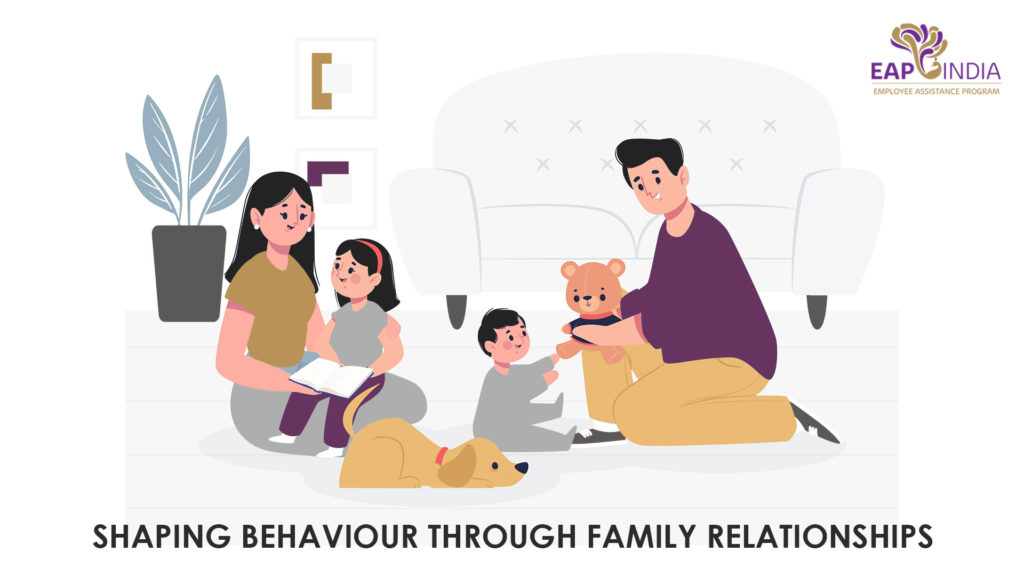Shaping is the process of reinforcing successively closer approximations to the desired terminal behaviour. The shaping of behaviour starts at an early age.
Steps involved in the process of shaping
In the start, reinforce any of the child’s behaviour that remotely is similar to the desired target achieving behaviour.
Next, reward only those behaviour that is close to the target behaviour.
Next, reinforce only those behaviour that resembles the target behaviour clearly and more closely.
Once the target behaviour is achieved, then reward only when the final behaviour is achieved.
Factors That Shape An Individual’s Behaviour
As we all know that, nature-nurture, both significantly contribute to the growth & development of an individual. Following are some factors that affect an individual’s behaviour while growing up:
- Hereditary
- Environment
- Exercise & health
- Nutrition
- Family relationships
- Socio-economic status
- Learning & reinforcement
This article is specifically about how family relationships shape an individual’s behaviour while growing up.
A family does play a vital role in shaping a child’s behaviour.
Families are the first person of contact that a child has while growing up. The child gets a deep understanding of himself, his relationships within the family unit, about other people around him and the world around him. It has been seen that loving, nurturing homes provide various opportunities for growth & bonding where an individual can thrive.
Family relationships include the relationship between the mother and the child, father and the child, siblings. There have been many studies that have shown that family relationships greatly impact people throughout their entire lives; especially when those family relationships are formed during early childhood.
Within the family relationships and development, there are a few factors that are needed to be considered that affect the individual’s overall development. The individual’s behaviour patterns get influenced because of the following:
- Family Emotional Development: Families encourage the individual’s emotional development from early life. Emotional development within family ranges from trust, comfort, compassion, empathy, and confidence. These emotions help the individual grow emotionally towards the people he/she builds their future relationships with. They learn how to communicate emotionally, healthily express their views and how to overcome difficulties and challenge others.
- Family Social Development: An individual starts to develop social skills from the time they are born and their earliest bonds are the initial interactions they have with their family members, especially their parents. They observe their parents, siblings, other family members and discover communication, cooperation. They try to engage with their family members based on observing and perceiving their family relationships. Studies have shown that families that treat their children with respect, love and promote valuable social and emotional skills provide a better style of social interaction for their young children.
- Family Physical Development: Nutrition and fitness habits within a family have a profound impact on the child. Nutrition, diet and fitness are included under physical development. Since, in the early years of growing up, the families are the first role models, children learn to imitate and adopt several behavioural patterns from their parents, siblings and other members of the family.
- Family Cognitive Development: Family dynamics do shape a child’s thinking, reasoning and problem-solving strategies. Family values, their style of interaction, their coping mechanisms, all influence and affects a child’s cognitive development and the way they perceive themselves and the world around.
Apart from the developmental process within the family, the parenting style also shapes a child’s behaviour.
There are different types of parenting styles.
In the 1960s, Diana Baumrind gave three different parenting styles.
Later, Maccoby & Martin added a fourth parenting style.
They were:
- Authoritarian Parenting Style: Authoritarian parents are obedience, status-oriented and expect their orders to be obeyed without any explanation. The children with parents who are authoritarian, they learn obedience, discipline, they even become proficient but research has shown that they lack social competence, have lower happiness levels and have average to low self-esteem.
- Authoritative Parenting Style: Authoritative parents are responsive to their child’s needs, are willing to listen to their questions. They provide warmth and support to their children. Children with parents who are authoritative develop skills of self-control, self-regulation and are happy, successful and rendered independent.
- Permissive Parenting Style: As the name suggests, these parents are responsive than demanding. They are lenient, avoid confrontation. Children whose parents are permissive, they have low happiness. The children have a hard time adjusting to authoritative figures throughout their lives. They may also suffer from self-esteem issues.
- Uninvolved Parenting Style: Uninvolved parenting style is generally detached and distant from their child’s life. They make sure their kids are fed and sheltered but do not show signs of guidance, structure, rules, or support. Children whose parents are uninvolved, they have low rankings in each domain of their lives, ranging from school, self, world, etc. These children lack self-control and are less competent from their peers.
Along with family development and different parenting styles, one most important area of development for an individual is “family time.”
There are several pieces of research on family time and a child’s development. The researches have found that family time is considered to be a vital part of the human developmental process and the family bonding system. Family leisure/time have consistently shown positive correlations between family recreation & family functions such as satisfaction and bonding.
The importance of family time is:
- The individual feels important and loved.
- They get an opportunity to model their parents, sibling’s behavioural patterns.
- The parents and siblings can observe & learn about their child’s strengths & weaknesses to guide them better.
- The child and the parent can develop a strong bond.
- The child gets a chance to voice their thoughts & feelings.
Crouter et al. (2004) found out that family time is important because the ecological perspective of the human development emphasizes the importance of doing joint activities such as building blocks of individuals competence & close relationships, which in turn trigger psychological adjustments.
Family time should be when everyone focuses their attention on only one another and can relax and enjoy themselves. Family time is valued to be important because they influence how an individual learns to function and interact within the society.
Conclusion
Parenting styles, having enough family time and developmental factors within the family, all of these influences and shape an individual’s behaviour from the time they are born till they’ve become independent and learnt things on their own.
Positive relationships with parents and siblings help an individual grow mentally, emotionally, physically and cognitively, whereas negative relationships with family can have several detrimental effects in life later on, and sometimes even while growing up.




